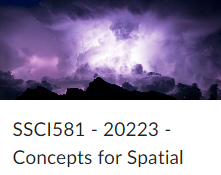SSCI 581 Week1
What Is GIS?
In technology part, GIS is the abbreviation of Geographic Information Systems
Computer-based (hardware & software) system that:
- Create locationally referenced data
- Stores and organizes locationally referenced data
- Performs spatial analyses
- Creates visualizations, usually in map form (but also tables, graphs, dashboards)
In theory part, GIS is the abbreviation of Geographic Information Science
- Theory behind how to solve spatial problems and how to implement GISystems
- The study of the design, data, and methods of GISystems
- Computational techniques and data structures
- The use, representation, analysis, and ethics of geo-referenced data
GIS also is A combination of
- The science of gathering, storing, processing, and delivering spatial data
- Tools and techniques such as land surveying, remote sensing, cartography, GIS, GPS, photogrammetry
- The social structures that enable the enactment of the science and tools
- The people enacting it all
Functions of GIS
GIS can:
- identify and analyze nearby Locations
- Find Spatial Patterns
- Determine Change Over Time
- Collect and Organize Spatial Information
- Track and Share Real-Time Data
- Manage Emergency Response
Fundamental concept & Keywords
-
Theory and Practice
- Theory
- A set of rules for understanding how something works
- Tied to the work of science and scholarship; looking for patterns, equations, or rules for how the world works
- Practice
- Action towards a goal. The enactment of Theory
- Tied to the work of technologists, explorers, tinkerers; doers rather than pure thinkers
- Theory
-
Structure and Agency
- Structure
- The underlying set of rules for how a society works, especially, how it reproduces itself
- A type of theory that emphasi zes the overarching rules of a society
- Agency
- The ability of the individual to exert choice of will within the social structure
- Agent-based social theories emphasize activism, change
- Agent-based modeling in GIS
- Structure
-
Objectivity and Subjectivity
- Objectivity
- The idealized mental position for scientific study
- The ability to objectively detect the world and analyze it, free from personal opinions and biases
- Subjectivity
- A set of beliefs that consciously (or unconsciously) affect one’s thought processes and actions
- The “myth of neutrality/objectivity” is undercut by scholars studying race and gender, who highlight the embeddedness and situatedness of all persons - our position in the world affects how we see the world
- Objectivity
-
Ontology and Epistemology
- Ontology
- Philosophical definition: The study of the categories of existence and the relationships among them
- In GIS: classifications and relationships between categories
- Think of a filing cabinet and the selection of folders
- Epistemology
- Definition: the study of knowledge
- How do we know what we know? What type of evidence do we accept?
- What data helps decide what goes in each filing folder
- Ontology
-
Nature and Society
- Nature: Long viewed as places untouched by humanity; more holistically as the physical world, including humanity
- Society: The organization of humanity in its many forms; traditionally seen as separate from / better than nature
- Nature/Society Critiques
- The idea of nature is socially produced;the physical world exits but there is no ‘nature’ aside from humans’ varying ideas about the physical world
- Human impacts are so widespread (climate change, pollution, land use) that no part of the Earth is unaffected by humanity
All articles in this blog are licensed under CC BY-NC-SA 4.0 unless stating additionally.
Comment


